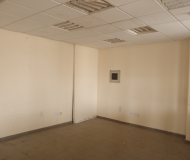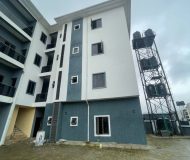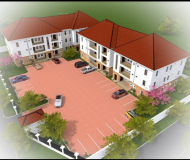
Environmental Impact of Building Projects in Nigeria
Environmental Impact is used to describe some implications of human activities on the environment. This article views the environmental impact of building construction projects in Nigeria.
The environment is threatened severely by so many problems, some of which are caused by the activities of Construction Projects. The major environmental impacts of building construction projects include environmental pollution, resource depletion and habitat destruction, causing destruction of ecosystem, desertification, soil erosion and increasing material Wastage.
For the sustenance and dynamism of livelihood, every growing society is characterized by the erection of either permanent or temporary structures for the purpose of shelter which is the second necessity of life. The quest for housing has tremendously increased urbanization and the built environment resulting in various environmental impacts and environmental degradation which is recently being traced to human activities with construction projects taking a lion’s share.
More commonly, environmental Impact can be said to be the effects of human activities on his environment. The construction industry is the major consumer of all resources of all industries in Nigeria. It accounts for 90% of all non-fuel mineral use, and a large proportion of timber use. The impact from processing and manufacture is not usually restricted to energy consumption but includes the physical degradation around mines, which includes loss of topsoil and forest. All types of buildings are consumers of power. Janda and Busch (1994) supported this assertion with research that concluded that 57% of electricity used in developed countries is consumed directly by buildings, out of which 31% is taken by residential buildings and 26% by commercial buildings, this makes building construction a source of environmental impact in Nigeria.
On-site activities require electricity for tools, machinery and for illumination. The use of petrol and fossil fuels by heavy equipment directly contribute to atmospheric pollution. In habitable buildings, energy could be used for many purposes such as for space heating and cooling, lighting, domestic hot water and to operate various appliances. However, with the inadequacy of electricity supply in Nigeria, the use of alternative sources of power; mostly generators powered by petrol or diesel make the situation worse still.
Another source of environmental impact is burning coal to produce steam for electricity. Coal accounts for the most carbon-intensive fossil fuel, releasing more than 29% more carbon per unit of energy than oil and over 80% more than gas. A significant amount of energy is devoted to heating, ventilation and air conditioning (HVAC) systems. For instance, in Nigeria, HVAC account for about 50% of the energy consumed in commercial buildings as against 15% used for lighting. Since much of the energy is in the form of electricity, it contributes much to Green House Gas emission.
HVAC systems in city buildings like Lagos, Ibadan and Akure contribute to urban heat. This occurs when cities experience higher temperatures than surrounding rural areas due to high heat absorption by paved areas. Buildings Space Conditioning systems contribute to this effect by removing heat generated by human activities into the air. The HVAC components themselves generate additional heat, which add to the amount of heat that is dissipated into the environment.
This explains the phenomenon where temperatures in urban areas are higher that the surrounding rural areas. Lighting in buildings is more or less exclusively provided by electrical means and therefore adds to the greenhouse problem in the same way that any electrical appliances or installation does. Thus, major disruptions for the earth’s ecosystems caused by human activities invariably will have implications for the people as well as other living things. This type of holistic perspective is extremely useful in understanding the environmental consequences of building construction projects in Nigeria
The construction industry is a major source of pollution responsible for about 4% particulate emissions, more water pollution incidents than any other industry, and thousands of noise complaints every year. Although, construction activities also pollute the soil, the main areas of concern are: air, water and noise pollution.
On the whole, the more energy required, and the more processes, the more waste and the more pollution is generated. Construction activities that contribute to air pollution include: land clearing, operation of diesel engines, demolition, burning and working with toxic materials. All Construction sites generate high level of dust (typically from concrete, cement, wood, stone, silica) and this can carry a large distance over a long period of time. That is why there has been a recent clamour for dry construction.
Sources of water pollution on building sites include: diesel and oil; paints, solvents, cleaners and other harmful chemicals; and construction debris and dirt. When land is cleared, it causes soil erosion that leads to silt-bearing runoff and sediment pollution. Construction sites produce a lot of noise mainly from vehicles, heavy equipment and machineries, and also people shouting at the top of their voice as well as radio turned up too loud. Excessive noise is not only annoying and distracting, but can lead to hearing loss, high blood pressure, sleep disturbance and extreme stress.
Another environmental building construction activity of great impact is the use of resources like timber and non- fuel materials. This leads to habitat destruction, loss of arable land and loss of biodiversity. While the three greatest and most imminent threats to the survival of our civilization are global warming, peak oil (the growing energy gap between supply and demand) and resource depletion. Sometimes, these can also have a global impact, for example the impact of deforestation of the Amazon rain forest (UN-Habitat, 2002).
Though, the environmental impacts of building construction activities may vary from country to country, the major environmental impacts are pollution, resource use and habitat destruction which is caused by destruction of vegetation, desertification, waste disposal, soil erosion and material wastage. Therefore, the use of Nigeria environmental protection board, ministry of the environment, environmental impact assessment tests reports and Nigeria conservation foundation to reduce environmental degradation and enhance sustainable environment becomes paramount.
Source: http://nigeriarealestatehub.com




